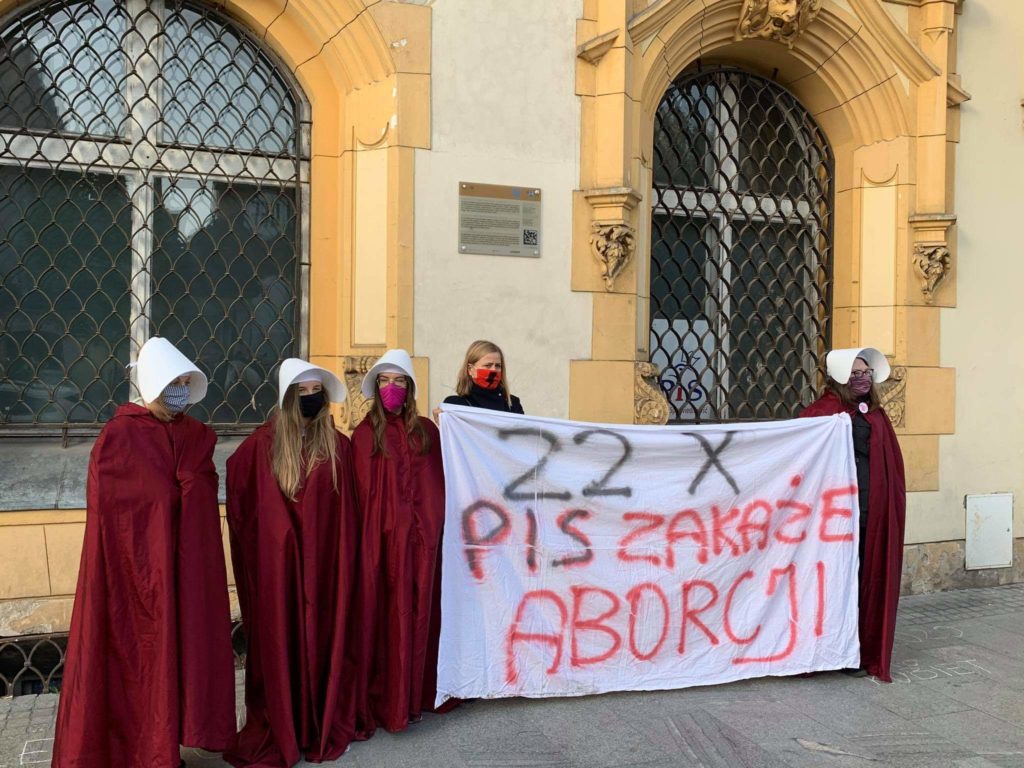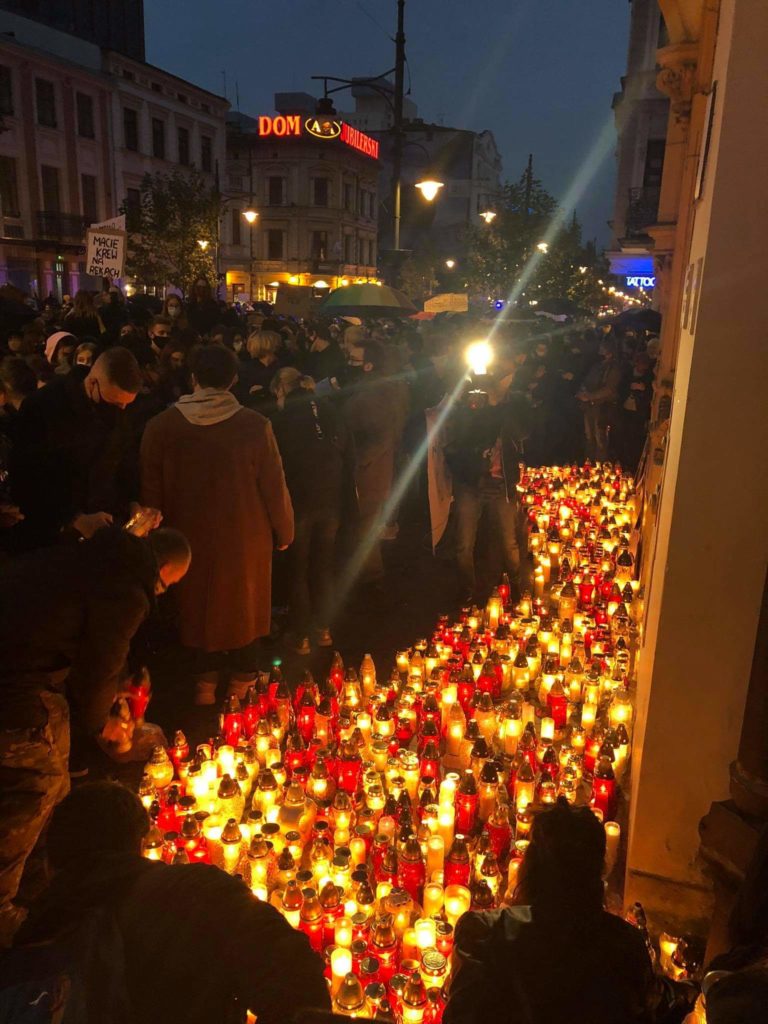Tom Lesniara talks to Aleksandra Sidoruk, a member of Łódzkie Dziewuchy Dziewuchom, to hear from the frontlines of the historic protests in Poland.
On 22nd of October, The Polish Constitutional Tribunal ruled that a statutory provision which allowed women to access abortions in cases of foetal abnormality was unconstitutional. The Tribunal Judge Justyn Piskorski later justified the decision by saying:
Human life is of value in any phase of development, and as a value at the source of which are constitutional laws, it should be protected by the legislators.
Quoted from Dziennik Gazeta Prawna, October 22 2020
The controversial ruling caused outrage in the country: for many, abortion laws in Poland were already too strict before the verdict. Hundreds of thousands of Poles have taken to the streets in what become the most significant public protest since the collapse of the Berlin Wall. Despite the protests leading to a delay in implementing the ruling, there are already right-wing campaigns to pass a new bill that would prohibit abortion in cases of pregnancy due to rape or incest.
Many 21st-century social developments and standards in Western Europe – such as increased LGBTQ+ rights, civil unions of straight and gay couples, the right to adopt, more liberal immigration policies, freedom of faith or abortion rights – are things Polish officials don’t even want to discuss. To make it worse, around half of the nearly 38-million people in the country don’t want them to either. The current governing party is Prawo i Sprawiedliwość (Law and Justice) – a conservative, far-right party with close connections to the Catholic Church. With recently re-elected President Andrzej Duda receiving official support from PiS and Prime Minister Mateusz Morawiecki being a member of PiS, the party has almost complete control over the Polish political landscape. Their biggest rival is Platforma Obywatelska (Civic Platform) – a party that also identifies as conservative, yet leans slightly towards the centre of the political spectrum. There is a mention of legalising same-sex civil unions in their manifesto for example, but abortion law is not referenced at all in the document. Left wing parties currently have limited support. In the last election to the Sejm (the lower chamber of Parliament), Lewica (The Left), which is an alliance of a few liberal parties, only managed to get 12.56% of the popular vote.
I caught up with Aleksandra Sidoruk, an International Relations student from Łódź, an industrial city in the central area of the country. When she’s not attending classes in diplomacy or foreign policy, she’s an activist. Aleksandra works together with the Łódź Girls for Girls (pol. Łódzkie Dziewuchy Dziewuchom), a feminist group. The foundation campaigns for the right to safe abortion and sex education in school, contraception, and LGBTQ+ rights. She attends marches on a regular basis, spreads awareness on safe protesting and is involved in her local division’s social media activity. Aleksandra is also planning on becoming a member of the Green Party.
When we talk, I spot a red lightning bolt painted on Aleksandra’s cheek. Next to the slogan WYPIERDALAĆ ( written in all caps, in this context meaning “get the fuck out”), the red lightening bolt is the main symbol of the feminist movement.

Aleksandra and I are both students; it’s a shame we have to meet in such challenging circumstances. I have never studied in my home country, but I don’t blame the older generation for Poland’s far right policies. A lot of young people, including Polish millennials and Gen-Z, share the views of their parents or grandparents. Another far-right political party Konfederacja (Confederation) consists mostly of young people and has a very strong social media presence. They’re responsible for aggressive counter-protests.
“A lot of my friends actively support the cause,” Aleksandra tells me. “So do my parents and other family members. Because of the pandemic they are not attending protests. I am the only “crazy” one in the family to go out to the streets. When it comes to my classmates – because most of us have classes via Microsoft Teams – you can change your avatar to the lighting bolt in support of the cause but I’ve only seen a couple of people do that. I know there are people who react to things I post, saying they admire me and what I do, as well as those who have very far-right opinions.”
Protesting for the right to abortion in a country like Poland is hard enough as it is. Now, with the ongoing second wave of coronavirus, Girls for Girls are doing their best to keep everyone safe. “I’ve never been that kind of person, to worry about such things,” said Aleksandra when asked whether she’s scared of catching the coronavirus. “The only thing I have at the back of my mind is that I am still in close contact with my parents. I always think about that when I’m attending a protest. They understand why I am doing this.
“When I’m heading to a protest I’m (of course) thinking about the virus. Some people are trying to attend the protests while not wearing a facemask, but we don’t let them. We can’t let them put anyone at risk. Not wearing a mask, shouting, singing while being really close to each other… recently in Łódź, we had 20,000 people protesting, you know.”
Aleksandra is right. The protests are attended by masses. In Warsaw, there have been about 100,000 protesters per day, on average. In other cities such as Kraków, Łódź, Wrocław or Gdansk, the numbers can vary from 10,000 up to 80,000 people per day. The recent Black Lives Matter protests in the United States, however, have proven that even large gatherings with tens of thousands of participants don’t have to contribute to an increase in COVID-19 cases if carried out safely.

“There are doctors and health professionals who work endlessly, day and night, to fight the virus and keep us safe. At first, I was unsure about their reaction and how they would take it, since we are increasing the risk in a way. It’s really amazing, though, to see them clapping and waving their little posters from behind the hospital windows,” said Aleksandra, describing the health professionals’ support as crucial and personally very important to her.
Following recent events, Jarosław Kaczyński – the leader of the governing party PiS and a brother of former Polish President Lech Kaczyński – addressed the nation directly in a video posted on the party’s official social media channels. Kaczyński expressed his disapproval of the protests and called them a direct attack on the Church. In the speech, he also referred to the Catholic Church as “the only moral system commonly known in Poland”, later saying that “the rejection of it is pure nihilism.” Since then, there have been several reports of Konfederacja supporters, who mostly are very young, trying to sabotage the protests in order to “protect the churches”.
“We get messages from people who added themselves to Facebook groups of potential attackers. They are really doing those things – pretending they’re supporting our protest and then attacking. Personally, I’ve not been a victim of an attack like this, but my friends have been in Warsaw. They said that some man just attacked a random woman with pepper spray, and I think he actually kicked someone as well.
“Here, in Łódź, we meet them when we’re walking by the church, that’s what they ‘protect’. They are not trying to attack us. The only exception I can recall was when one of our protesters had a rainbow flag with her and the counter-protester took it away from her and tried to push her, but there were some people that didn’t let that happen.”
As for now, the protests are still going on. Recently, there have been reports of plain clothes anti-terrorism units using violence against peaceful protestors in Warsaw. To help the feminist movement in Poland, you can follow the national feminist foundation Dziewuchy Dziewuchom on social media, help spread awareness or make a donation on their official website.
Correction: The previous version of this article stated that President Andrzej Duda is currently a member of PiS. According to political convention, upon election the President resigns any party membership. Therefore, President Duda has not been a member of PiS since his election in 2015. President Duda received official support from PiS during his election and re-election campaigns in 2015 and 2020.
Tomasz Lesniara is a 2nd year Media and Communication student at City of Glasgow College. You can read more of his work, and about him, on his website.
You can follow Aleksandra Sidoruk on Instagram with the handle @olasidoruk.
